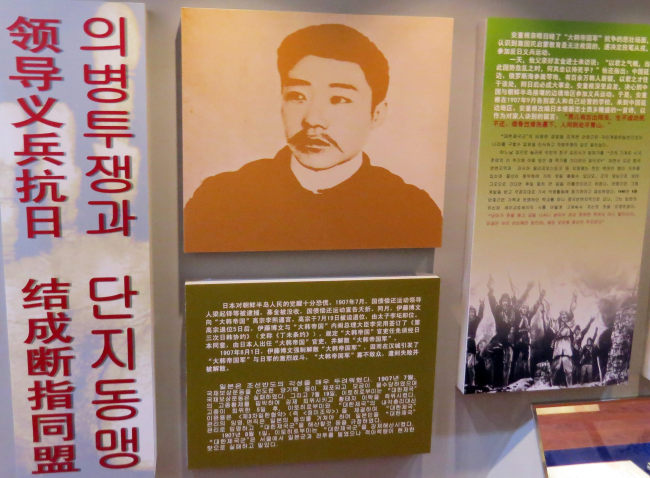[Newsmaker] Korea-Japan tension rises over memorial
By Shin Hyon-heePublished : Jan. 21, 2014 - 20:06

Tension is intensifying further in Northeast Asia after Japan protested the launch of new facilities devoted to a Korean independence fighter in China, triggering strong condemnation from Seoul.
Tokyo’s Chief Cabinet Secretary Yoshihide Suga on Monday slammed the memorial hall that opened a day before to honor Ahn Jung-geun, who fatally shot Japan’s first Prime Minister Hirobumi Ito in Harbin in 1909 in protest against its colonial rule.
Suga said Ahn was a “terrorist sentenced to death” for the assassination. “I express deep regret that Korea and China are jointly carrying out an international move based on unilateral assessment, which doesn’t help with the establishment of peace and cooperative relations in the region,” he told reporters.
Seoul’s Foreign Ministry issued strong condemnation directly aimed at Suga late Monday, calling his remarks “preposterous and anti-historical.”
“Hirobumi Ito coerced the Empire of Korea into the Korea-Japan Treaty during the Japanese imperial era, led Japan’s invasion of the Korean Peninsula by mobilizing force, and is the main culprit who trampled down peace in the peninsula and Northeast Asia and cause unspeakable pain and mischief,” ministry spokesman Cho Tai-young said in a statement.
“Nonetheless, we cannot repress our astonishment at such preposterous and anti-historical remarks by the chief secretary who represents the Japanese government. This clearly shows that Japan’s ruling clique has yet to break out of the regressive historical perception, beautifying and justifying its past of imperial aggression.”
President Park Geun-hye requested the erection of a monument revering Ahn’s sacrifice during her summit in June with her Chinese counterpart Xi Jinping, who responded with the new memorial hall.
Junichi Ihara, director general for Asian and Oceanian affairs at the Japanese Foreign Ministry, lodged a protest to the embassy ministers of Korea and China in Tokyo by phone on Sunday.
Beijing dismissed the protest as “unacceptable,” reiterating calls on Japanese leaders to face up to history.
“Ahn Jung-geun is a renowned anti-Japanese figure who is also admired by the Chinese people,” Chinese Foreign Ministry spokesman Hong Lei told a daily briefing on Monday, saying the memorial was thus “completely reasonable and justifiable.”
Already frayed by territorial and historical feuds, Tokyo’s relations with its neighbors plummeted to a new low after Japanese Prime Minister Shinzo Abe’s much-dissuaded trip to the controversial Yasukuni war shrine last month.
Seoul and Beijing condemned it as an attempt to whitewash the country’s imperial past, while Washington expressed “disappointment,” warning of further tensions in the region.
Though Korea and China “closely cooperated” on the memorial, Seoul apparently remains wary of giving a sign that it would join hands with Beijing for any joint action over historical issues, given its crucial economic and strategic partnership with Tokyo and trilateral cooperation involving Washington, a staunch ally of both.
The assassination of Ito came shortly before Japan’s full-fledged colonization of the Korean Peninsula. Ahn was executed at a Japanese prison in the northern Chinese city of Ryojun, now called Lushun, in 1910.
By Shin Hyon-hee (heeshin@heraldcorp.com)




![[Herald Interview] 'Amid aging population, Korea to invite more young professionals from overseas'](http://res.heraldm.com/phpwas/restmb_idxmake.php?idx=644&simg=/content/image/2024/04/24/20240424050844_0.jpg&u=20240424200058)












![[KH Explains] Korean shipbuilding stocks rally: Real growth or bubble?](http://res.heraldm.com/phpwas/restmb_idxmake.php?idx=652&simg=/content/image/2024/04/25/20240425050656_0.jpg&u=)

